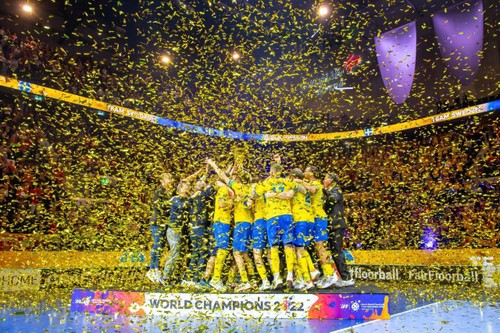 (Photo courtesy of Embassy of Sweden in Hanoi) (Photo courtesy of Embassy of Sweden in Hanoi) |
Bao Tram: Thank you, Christofer Fredriksson, for spending time with VOV24/7’s Cultural Rendezvous. Tell us briefly how floorball began.
Christofer: Floorball was born in Sweden in the early 70s. There is a version from America, but they made it more suitable for the Swedish audience. As I was born around those years, floorball has followed me my whole life. It was played in school, and when we had athletics in school and the teacher said, today we’ll play floorball, everybody was saying Yeah! and celebrating. I can hardly remember one kid in Sweden who didn't have a stick in his hand to play floorball.
Bao Tram: I looked it up on the Internet and learned that it’s similar to hockey. In what way does it differ from hockey?
Christofer: It reminds me very much of hockey, but hockey is more physical. You're allowed to use your whole body when you play ice hockey, and you need to skate. In floorball you just run. You don't need to skate. You run around and follow the ball. Tactically, it’s a team sport, so as in football or any other team sport you need to be aware of where your team members are so you can pass them the ball.
Bao Tram: How popular is floorball in Sweden?
Christofer: Since the early 70s, floorball has taken off like a rocket. Today it's the second most popular sport in Sweden, after football. It's played by people of all ages and by both men and women. Some kids get their first stick and ball when they are 4 or 5 years old and, as I said, it's the second most popular sport in Sweden. Many companies and institutions have their own team and play against each other afternoons or weekends. Of course, there’s also a professional level. I think every city has both a men’s and a women’s floorball team.
Real floorball is played indoors. But the version we’re going to demonstrate this weekend at the European Village is something called street ball, which is a variation of it. You use the same equipment, but you can play it on all kinds of surface - asphalt, grass, even snow. Some kids play it in their house and their parents get furious because paintings on the wall can get destroyed by the ball flying around the room. It’s a team game. For street ball, you can play 2 on 2. You don't need a goalkeeper as you do in traditional floorball.
Bao Tram: What are the rules and what equipment do you need?
Christofer: The equipment you use is a stick and a ball, basically, and you pass the ball between the members of your team. It's a high-speed game. You run around with your stick, but you're not allowed to hit anyone with it, and you're not allowed to use your body to strike anyone. You're not allowed to have the stick above your knees when you shoot the ball on goal. It's a small plastic ball and the sticks are also made of plastic. I've been in Vietnam since 2002 and I'm really surprised that floorball isn’t played on a broad scale here, because, first of all, it's a very easy game to play, and the equipment doesn't require a fat wallet like many other sports. It can be played, as I said, basically anywhere.
 Christofer Fredriksson, a visual artist Christofer Fredriksson, a visual artist |
Bao Tram: You’ve said what players are not allowed to do. What can they do?
Christofer: Floorball is a team sport. Two teams play against each other. One team can vary from two persons up to 4 or 5, depending on how big a playground you have. You have a ball and a stick and you pass the ball to your teammates and try to score a goal. The goal looks like a mini version of a football goal. Each game is 12 minutes long and you're allowed to change players as the game is going. It's a high-speed game which makes it very interesting both to play and to watch.
Bao Tram: You said everyone plays floorball in Sweden. How about in other countries?
Christofer: Sweden has a very successful national team, both the men and the women. They’ve won many gold medals at the World Championships. Today, as the sport has spread, there are more national teams coming up, like Czech, Slovakia, Finland, and Switzerland. It has spread to, I think, 80 countries around the world. In this region, Singapore is probably the most successful team, especially the women’s team. In December this year’s World Championship for women will take place in Singapore. I think Thailand has a very good team. Unfortunately, not Vietnam yet, but maybe this will generate some interest in the sport.
Bao Tram: You play floorball yourself. What’s the hardest part of playing floorball?
Christofer: The trickiest thing for me, personally, is that I'm getting old. I mean, it's a very high-speed game. When I run around and try to catch the ball and try to pass the ball to others and everybody else is only 25, I’m lost. I’m not at that speed any longer. In terms of technique, you can practice a few hours and then you know how to handle the stick and how to pass the ball. As I said, this sport has been in Sweden since the early 70s and you play throughout your childhood and teen years. I wouldn't say there is much technique to learn.
Bao Tram: Thank you, Christofer Fredriksson, for granting VOV this interview. We now know a little more about floorball, a new sport to most Vietnamese people. We hope in the near future Vietnam will have a professional floorball team and more and more people will be playing it.
Christofer: Thank you. It was my pleasure. Everybody please visit the European Village this weekend.